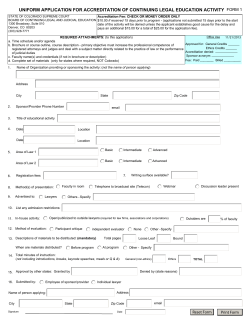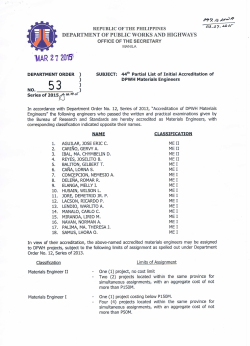
The Green Climate Fund and its National Designated Authorities
Update on the Green Climate Fund Dr. Binu Parthan Regional Networking Meeting for National Designated Entities Bangkok, 29th April 2015 The Green Climate Fund • Operating entity of the financial mechanism of the UNFCCC, CoP16 • Centrepiece of long-term finance under UNFCCC • Secretariat CoP19, December 2013 Songdo; • Fully operational, staffed and resourced Our Vision • • Promote a paradigm shift towards lowemission and climateresilient development Induce a change in the daily decisions investors and consumers make Make Best Investments Viable ….with the Least Possible Concessionality Without the Fund With the Fund • High Upfront Capital; • Buy-down Upfront Cost; • Insufficient revenues; • Cash Flows Eased; • Excessive Risk • Higher Risk Tolerance. Allocation Framework Total Fund Portfolio Adaptation Portfolio Mitigation (50%) Adaptation (50%) • • • • SIDS, LDCs & Africa (at least half) Other Developing countries Geographic balance Significant allocation to Private Sector Facility Sufficient resources for readiness activities Grant equivalent term Resource Mobilisation • $ 10.2 Billion commitments – 179 million ~ only 1.9% realised! • Mostly grants and loans (France & Canada); • 33 countries including 8 developing countries contribute resources; • Major contributors – US, Japan, UK, Germany, France Moving into full operation Readiness programme, Accreditation framework approved at 8th Board meeting Achievements: 2014 May June July Aug Sept Oct Nov Essential operational policies adopted at 7th Board meeting 2015 Jan Milestones: Feb Pledging conference Dec Lima COP ($10.2 billion) Mar 1st group of 7 entities accredited Apr May >50% of pledge converted to contribution arrangements Jun Jul Aug Sep Oct Funding proposals approved What’s New? • Direct Access – ‘Enhancing DA’ • Private Sector Facility; • Range of Instruments– Grants, Debt, Equity, Guarantee; • Scale – Climate Finance; • Accreditation – ESS, GP Readiness Support • Readiness is a strategic priority of the Fund: help maximise effectiveness and reduce risks, good delivery; • Ensures funding suits country contexts and needs, and increasing effectiveness; • Readiness Support to India under scoping – NDA strengthening, stakeholder engagement. • Delivery – National, International (GIZ, UNDP, WRI, UNEP, KfW etc.), Global (PwC); • Support for Accreditation – Applicant Entities – Country Driven; Strategic Frameworks including CWPs Five Pillars Establishing & Strengthening NDAs/FPs Readiness Support Initial Pipeline of Programme and Project Proposals Selection of Intermediaries/IEs and accreditation support Information sharing, experience exchange and learning Engagement 121 designations with 70 readiness requests (as of 24 th April 2015) Accreditation of National Entities/Intermediaries • Direct Access – with NDA no-objection; • Assessed Against Fund’s Fiduciary standards, ESS, GP, GAP 2015-17 • 3-stage process, applications open since Nov ‘14 Accreditation – Status Update (as on 24 th • Accreditation applications received: 45; • 7 Accredited – CSE Senegal, Profananpe Peru, Acumen Fund, SPREP Samoa, UNDP, AsDB, KfW. • Accreditation applications • National/regional: 14 • Private: 8 • International -23 April 2015) Accreditation Process Submission of the full application for accreditation by the entity Stage I: No-objection, institutional assessment and readiness Responsibl e International access Direct access Step 1: Noobjecti on Step 2: Institutio nal assessm ent Step 1: Secretaria t Stage III: Final validation and legal arrangements Step 3: Readin ess Institutional assessment NDA Stage II: Review and decision Secretariat in cooperation with the applying entity Step 1: Review Step 2: Decision Step 1: Final validation Step 2: Legal arrangements Step 1: Review Step 2: Step 1: Final validation Step 2: Legal arrangements Accreditation Panel and technical experts on a needs basis Decision Board Trustee/Secretariat* *To be defined in the context of provisions for legal and formal arrangements with intermediaries and implementing entities, including policies on fees and payments. Food and water security Increased resilience of ecosystems Increased resilience of infrastructure Increased resilience of people and communities GCF Strategic Impacts Reduced emissions in transport Reduced emissions from land use and forests Reduced emissions in buildings and cities Reduced emissions in energy Private Sector Facility Areas of Priorities On & Off Grid Low-Emission Energy Public Transportation Waste & Water Management -Bus, Rail, Metro and Bike Urban -Waste-to-Energy -Waste Recycling -Water Treatment Energy Smart Buildings, Companies & Cities -Buildings -Traffic Systems -Public Lighting -Industry -SMEs -Homes Water Forestry Agriculture -Irrigation -Land and Water Efficiency -Crop Diversification Rural -Pulp and Paper Forest Farms -Eco Tourism Investment Criteria against which proposals are assessed Impact Potential Paradigm Shift Potential Sustainable Development Potential • Potential to the achieve the Fund's objectives and result areas • Potential to catalyse impact beyond a one-off project or programme investment • Potential to provide wider benefits and priorities Needs of Recipient • Vulnerability and financing needs of the beneficiary country Country Ownership • Beneficiary country ownership of and capacity to implement funded activities Efficiency & Effectiveness • Economic and, if appropriate, financial soundness of the programme/project Investment Framework Investment Criteria Coverage areas Sub-criteria Further elaborate the investment criteria Indicative assessment factors Provide clarity on how sub-criteria could be assessed Apply to all proposals Only relevant and applicable ones apply Proposal Approval Process NDA No-objection 1 Generation of funding proposals Submission of funding proposal 4 Analysis and recommendation Technical Advisory Panel 5 Board Decision Board Based on Board decision B.07/03 Legal arrangements Accredited Entity Secretariat 3 Concept development (voluntary) Trustee 2 6 Financial Terms and Conditions • Major convertible currencies; • Grants – Without repayment – Public Sector; – With repayment – Private; • Concessional Loans - Public – High- 40 yrs; 10 Yrs; 0%; Service fee 0.25%; Commitment fee -0.5%. – Low- 20 yrs; 5 Yrs; 0.75%;0.5%;0.75%. • Private Sector- case-by-case – 20 Yrs; 5 Yrs max; not more than public; • Consider terms & conditions to recipient by AE vs what is requested; Technology Mechanism and GCF • NDAs and NDE dialogue and coordination; • Country Strategic Framework/CWP – map TNAs –TAPs & project ideas; • TNA results implementation – projects/programmes? Outlook • Resource pledges – Positive but to be realised; • To support best possible projects through existing and new channels; • Less Process and More Access; • Coordination NDAs and NDEs Thank You Contact us at countries@gcfund.org or bparthan@gcfund.org
© Copyright 2025




![National University Virtual High School [2014-2015]](http://cdn1.abcdocz.com/store/data/000348438_1-3a80ae3134ab49395c6a7578fe5bdf0b-250x500.png)








